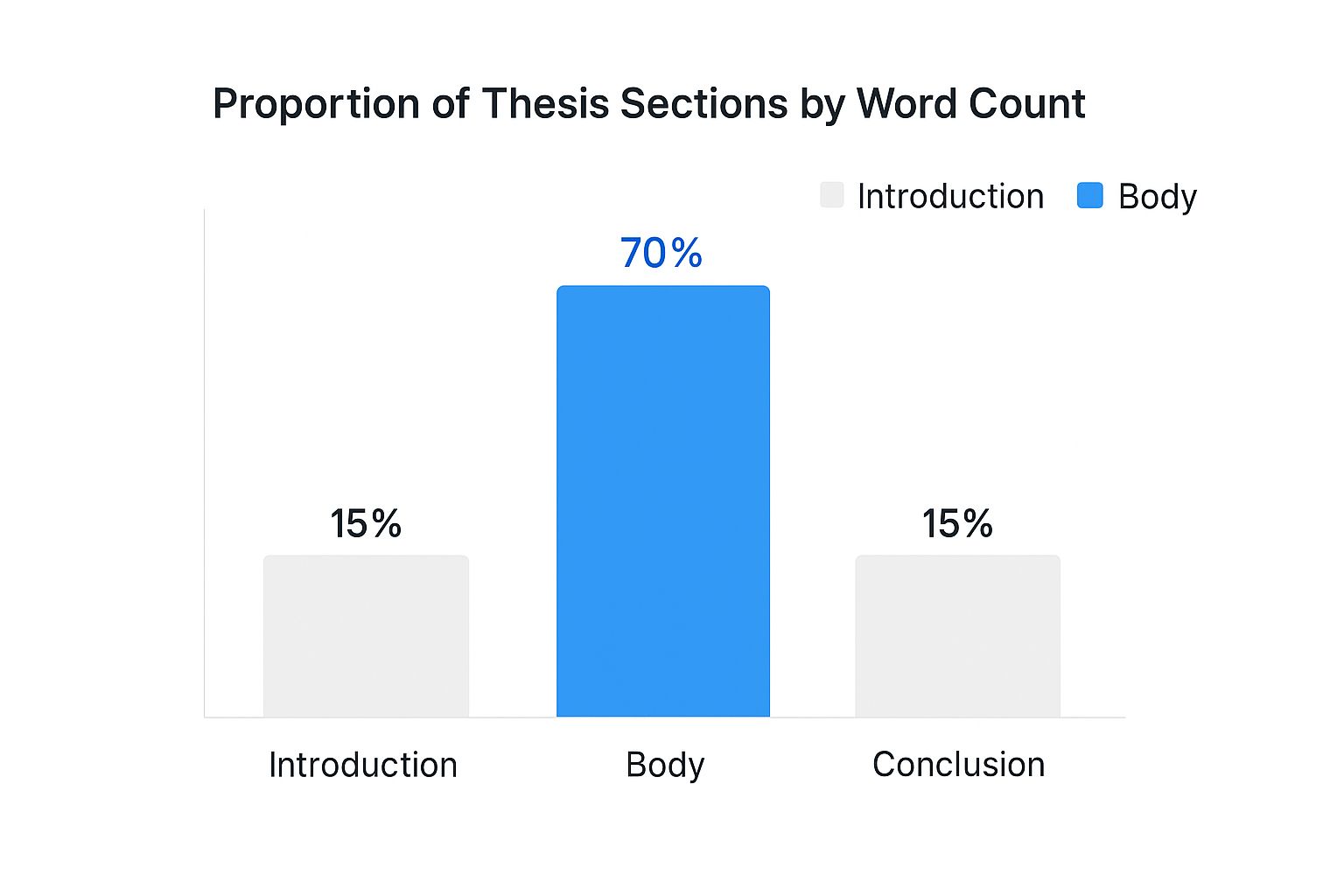Help With Thesis Writing: Your Complete Survival Guide

What You're Actually Getting Into (The Reality Check)
Let's be real, writing a thesis is an emotional rollercoaster. You dream of brilliant insights and flowing prose, but the reality often looks more like late-night panic and a complicated relationship with your advisor. One minute you're on top of the world, the next you're staring blankly at your screen, questioning all your life choices. This is normal! Knowing what to expect is half the battle.
Picking a flashy-sounding topic often backfires. You'll be spending a lot of time with this topic, so genuine interest is crucial. Think of it like picking a travel buddy for a long trip – looks aren’t everything. You need someone you'll actually enjoy spending time with, even when things get tough. Choose a topic you’re passionate about, and the whole process becomes much more manageable. Sometimes, even enjoyable.
Your timeline will probably be longer than you initially planned. Factoring in unexpected delays, writer's block, and just regular life stuff is key. Building in buffer time from the beginning will save you so much stress later. For example, giving yourself extra time for research and drafting can help you avoid those last-minute all-nighters.
Understanding your writing style early on is also helpful. Are you a planner or a pantser? Figuring out your quirks will help you tailor your approach and avoid frustration. It's interesting to note the global essay writing service market, including thesis assistance, is projected to reach USD 4.35 Billion by 2032. This shows just how many people seek help with thesis writing. Discover more insights into the growing demand for writing assistance. Setting realistic expectations for both your timeline and the process itself is essential for staying sane and making the experience more fulfilling.
Research Like You're Solving a Crime (Not Just Collecting)
Effective thesis research isn't about stacking up a ton of papers. It's about asking smart questions and following the evidence, like a detective working a case. Think of citations as clues leading you to the most relevant sources. This targeted approach keeps you from getting lost in a sea of irrelevant info.
I remember when I was researching my own thesis, I spent weeks just gathering anything remotely related to my topic. It was overwhelming and unproductive. I wish I'd focused my energy from the start.
- Map out key areas to investigate
- Follow citation trails like breadcrumbs
This detective mindset makes all the difference.
During the research phase, it's easy to slip into bad habits, but you can learn how to stop wasting time. Features like Word Spinner’s integrated Scholar Mode and real-time source integration are really useful. Scholar Mode helps quickly analyze sources and find the main arguments, while real-time source integration keeps your citations organized right from the beginning. This way, you can focus on the meaning of your research, not the busywork.
Digging Deeper: Beyond Surface-Level Sources
Good research is also about finding the gaps in existing knowledge. What hasn't been answered? What perspectives are missing? This is where your original contribution comes in. For example, if everyone's focused on the economic impact of a certain policy, maybe you explore the social or environmental effects.
This kind of critical thinking elevates your research from summary to a unique contribution.
Interestingly, the market for thesis writing services is growing. Projections suggest significant expansion between 2025 and 2032, driven by the demand for quality academic work. Discover more insights about the evolving market for thesis writing assistance. This highlights the growing need for "help with thesis writing" and the importance of solid research skills.
Finally, don't underestimate good note-taking. A well-organized system will save you so much headache later on. Trust me, you don't want to be frantically searching for that perfect quote months down the line. Word Spinner’s citation management is a real lifesaver here.
Building Structure That Serves Your Argument (Not Generic Templates)
The infographic above gives you a visual idea of how the word count typically breaks down in a thesis. Notice how the introduction and conclusion each take up about 15%, leaving 70% for the main body. This really highlights where you'll be focusing most of your energy—developing those core arguments and laying out your evidence. But hitting your word count isn't the whole story. You need a compelling narrative that flows. Sometimes, research throws you curveballs. Don't be afraid to think outside the box when it comes to problem-solving. If you're looking for ways to jumpstart your creativity, check out this resource on sparking creativity.
Forget those generic templates! Think of your thesis structure as a storytelling device. Your research has a unique story, so let your structure reflect it. A history thesis might unfold chronologically, while a scientific thesis could be organized around different experiments or hypotheses. The key is to design a structure that supports your argument and guides your reader through your research journey.
Beyond the Standard Chapters: Creating Flow
Think of your chapters not as separate blocks of text, but as interconnected pieces of a larger puzzle. Each chapter should build on the previous one, creating momentum and leading toward your final conclusion. Smooth transitions are essential. For example, try ending a chapter with a thought-provoking question that the next chapter will answer. This keeps your reader engaged and helps them see the bigger picture.
The methodology section is often a sticking point. It's easy to get lost in the technical weeds, but remember, clarity is paramount. Explain your methods clearly and concisely, focusing on why you chose those methods and how they contributed to your research. Think storytelling, not just a laundry list of technical steps. If you're using AI tools in your research, you might find this guide on ethical AI usage helpful. Structuring these challenging sections is a big part of what people mean when they search for "help with thesis writing".
To illustrate how thesis structures can vary, let's take a look at this comparison table:
Thesis Structure Comparison by Field
| Academic Field | Typical Chapter Structure | Average Length | Key Focus Areas |
|---|---|---|---|
| Humanities | Introduction, Literature Review, Analysis, Discussion, Conclusion | 80-100 pages | Critical analysis, interpretation, argumentation |
| Sciences | Introduction, Methods, Results, Discussion, Conclusion | 60-80 pages | Experimental design, data analysis, interpretation |
| Social Sciences | Introduction, Literature Review, Methodology, Findings, Discussion, Conclusion | 70-90 pages | Research methods, data collection, analysis |
This table highlights how different fields emphasize different aspects of research. Humanities theses prioritize critical analysis and interpretation, while Sciences focus on experimental design and data analysis. Social Sciences combine aspects of both, emphasizing research methods and data collection. Understanding these differences can help you tailor your structure to the specific requirements of your discipline.
Writing Your Messy First Draft (Permission to Suck)
Let's be honest, that first draft of your thesis? It's going to be rough. Think of it like the messy, chaotic artist's studio before the masterpiece emerges. Don't stress about perfection at this stage – just get the words down. Trust me, getting something, anything, on paper is a huge victory.
This initial phase is all about conquering the blank page and resisting the urge to edit every single sentence. I remember writing my first thesis draft and thinking it was utter garbage. I'm sure you'll feel the same way at some point! I even almost gave up a few times. But I persevered, reminding myself that this draft was simply a starting point. One day, I just wrote random phrases and bullet points, anything to break through the writer's block. You won't believe it, but those fragments eventually blossomed into paragraphs and then entire sections.
Taming Perfectionism and Finding Your Flow
Perfectionism can be a real obstacle when writing a first draft. It's that inner voice telling you every sentence needs to be flawless before moving on. Learning to quiet that voice is essential for maintaining momentum. Word Spinner's Focus Mode can be incredibly helpful for this. It minimizes distractions and creates a dedicated writing space. This lets you focus on getting your ideas out without the constant temptation to revise. Check out their tips on humanizing AI-generated content for some good general writing advice. It’s surprising how small changes can really elevate your writing.
Another hurdle is keeping up your momentum, especially when motivation flags. Setting a writing routine, even if it's just for 30 minutes each day, works wonders. Think of it like going to the gym – consistency is key. Some days you might only manage a few sentences, other days you'll write pages. The important thing is to stick with your writing schedule, even when you don’t feel like it.
Embracing the Mess: It's Part of the Process
Remember, this draft is meant to be messy. It's a place to explore your ideas, play with the structure, and get your thoughts out without judgment. Consider it a sandbox for your ideas. Don't be afraid to write badly – in fact, give yourself permission to write terribly! This freedom to explore without pressure is where real creativity takes root. This "messy" stage is a crucial part of writing a thesis. It gives you the raw material you'll refine later. It’s the foundation upon which you'll build a polished and compelling final product. So, embrace the mess. It's proof that you’re making progress, even when it doesn’t feel like it.
Surviving Feedback Without Losing Your Mind
Let's be honest, getting feedback on your thesis can feel like a punch to the gut. You've poured months of your life into this thing, and then your advisor's comments come back and suddenly you're questioning everything. That one word – "interesting" – hangs in the air, leaving you wondering if it's academic code for "utterly confusing." Trust me, this is completely normal. It's all part of the process. Learning how to interpret feedback is a skill you'll hone over time.
One thing I've learned is to really focus on the substance of the critique, not just the tone. What specific changes are they actually asking for? Sometimes, "interesting" really does just mean they want you to expand on a point or make it clearer. In those early, messy drafts, a Text Generator can be a lifesaver for getting past writer's block. It helps get your ideas down without the pressure of perfect phrasing.
When revisions start piling up and everything feels equally urgent, prioritizing is key. I always tackle the big-picture stuff first – the structure, the core arguments, the analysis. Then, I move on to the smaller details. Remember, a revised thesis isn't a weaker thesis, it's a stronger one. Interestingly, the market for content writing services, which includes thesis support, is expected to grow by 5.50% between 2023 and 2030. This shows just how much demand there is for help with this kind of writing. Discover more insights about this trend.
Getting conflicting feedback from different committee members is another level of challenge altogether. It can feel like trying to navigate a minefield. Whose advice do you follow? It's perfectly acceptable to (respectfully) push back if suggestions contradict each other. Clearly explain your reasoning and try to find a compromise that addresses everyone's concerns. As you're revising, something like bypassing AI detection can be a helpful consideration. In the end, the key is to maintain your own voice while incorporating feedback. This creates a thesis that is both academically sound and truly your own. This whole process, as tough as it is, will ultimately strengthen your work and get you ready for whatever academic adventures come next.
The Final Push Without Falling Apart
Finishing your thesis is a whole different ballgame. You're not so much writing new stuff as you are refining what you've already got. This is where those often-forgotten details—formatting, citations, even your acknowledgments—suddenly become super important. These little things can really make your thesis shine… or, unfortunately, detract from all your hard work. They're the things that show you've put in the extra effort and created a truly professional piece of scholarship.
Proofreading and Formatting: The Unsung Heroes
Seriously, don't underestimate the power of good proofreading. Don't just glance over your work. Actively search for errors. Read your thesis out loud. Print a physical copy and mark it up. Even better, ask a friend for a fresh perspective. After months of staring at your screen, they're guaranteed to catch things you've missed. And then there's formatting. Consistent headings, page numbers, and margins might seem tedious, but they show attention to detail. If you’re using Microsoft Word, explore its built-in formatting tools, or consider a tool like Word Spinner’s Auto-Formatting to handle these details. You can even find helpful resources online, like this article on how to avoid AI detection in writing.
Crafting a Compelling Abstract and Acknowledgments
Think of your abstract as your thesis's elevator pitch. It has to be short, sweet, and get right to the heart of your research. It's the hook that grabs the reader's attention. Your acknowledgments, while often an afterthought, are also an important opportunity. Take the time to sincerely thank everyone who helped you along the way. Make it personal, not just a generic list of names.
Final Formatting and Defense Preparation
It's totally normal to feel overwhelmed in the final stages. A checklist can be a lifesaver. Double-check your formatting, make absolutely sure your citations are accurate, and make sure your appendices actually support your work rather than adding clutter. Preparing for your defense is its own challenge. Practice your presentation, think about potential questions, and most importantly, remember that you are the expert on your research. You've totally got this! This last bit is tough, but it's also incredibly rewarding. It’s the culmination of months, maybe even years, of work. It's the moment you finally get to share your contributions with the world.
Before you submit, take a look at this checklist. I found it helpful to categorize everything and prioritize tasks based on how much time they took.
Final Thesis Checklist by Category
| Category | Essential Items | Priority Level | Time Required |
|---|---|---|---|
| Formatting | Consistent headings, page numbers, margins | High | 2-3 hours |
| Formatting | Correct font, line spacing | Medium | 1-2 hours |
| Content | Proofread for typos and grammatical errors | High | 4-6 hours |
| Content | Verify accuracy of data and figures | High | 2-4 hours |
| Citations | Check completeness and consistency of citations | High | 3-5 hours |
| Appendices | Organize and ensure relevance of appendices | Medium | 1-2 hours |
| Abstract | Write a concise and engaging abstract | High | 1-2 hours |
| Acknowledgments | Write sincere and personalized acknowledgments | Medium | 1 hour |
| Defense Prep | Practice presentation and anticipate questions | High | 4-6 hours |
This checklist helps ensure you’ve covered all the bases before submitting. Remember to allocate enough time for each category, especially those high-priority items. Good luck!
Beyond Submission (Making Your Work Count)
So, you’ve finally done it. Thesis submitted, defense conquered—you’re officially a survivor. But amidst the celebrations, a common question creeps in: "Now what?" It’s easy to get so caught up in the marathon of writing that we forget to think about the finish line. But trust me, submitting your thesis isn't the end. It's a brand new beginning.
You’ve poured your heart and soul (and probably a few late-night coffees) into this research. You've become a low-key expert in your chosen field. Now it's time to flex that expertise and make it work for you.
From Thesis to Real-World Impact
The most frequent post-thesis question I hear is: "What do I do with this massive document?" For one thing, think about repurposing those chapters into engaging articles. Imagine your research reaching a wider audience. Ditch the academic jargon, highlight the key findings, and tell the story of your research in a way that everyone can understand. Presenting your work at conferences is another fantastic opportunity. It’s a chance to share your findings, network, and get feedback from others in your field.
Here’s a peek at Google Scholar:
This screenshot shows the sheer volume of research out there. Your thesis can join the conversation! Use Google Scholar to explore related work and discover how your research fits into the bigger picture.
Leveraging Your Research for Career Advancement
Whether you’re pursuing an academic career or venturing into something new, your thesis is a powerful tool. It showcases your ability to conduct in-depth research, manage complex projects, and communicate effectively. Make sure your resume and job applications highlight these valuable skills. Be ready to discuss your research in interviews – it’s your chance to shine.
If you’re applying for research-oriented roles, emphasize your methodology and data analysis skills. For communication-focused roles, highlight your ability to synthesize information and present it clearly.
And don’t forget about networking! Attend industry events, connect with people on LinkedIn, and reach out to professionals in your field. A simple conversation can open doors to unexpected opportunities.
Navigating the Post-Thesis Emotional Landscape
Finishing a thesis is a huge achievement, but it can also be an emotional rollercoaster. It's okay to feel a sense of letdown, or even disorientation, after submission. Give yourself time to relax, celebrate your success, and recharge. You’ve earned it!
Remember, your thesis is a major milestone. You've gained invaluable skills and knowledge, contributed to your field, and opened up exciting new possibilities. Now it's time to explore them.
Ready to supercharge your writing? Explore the power of Word Spinner and discover how its AI-powered features can elevate your work. Start your free trial now!



